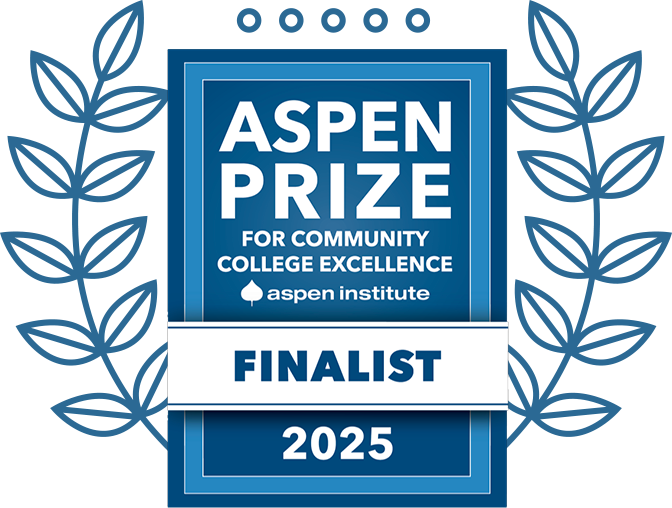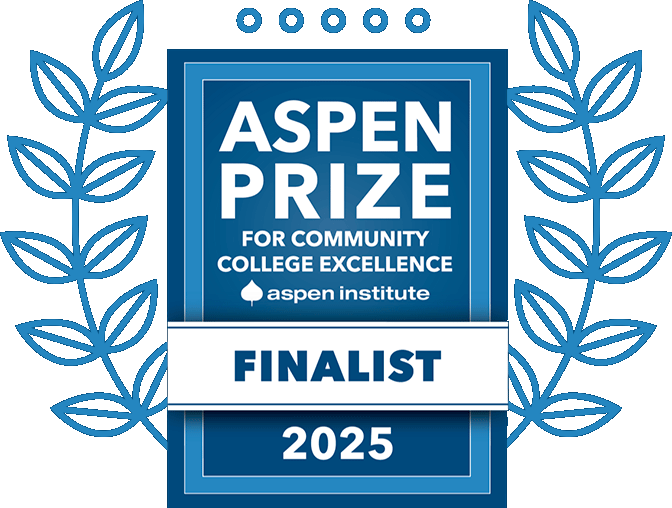GHC becomes one of eight USG colleges to launch a pilot kiosk for digital doctor visits
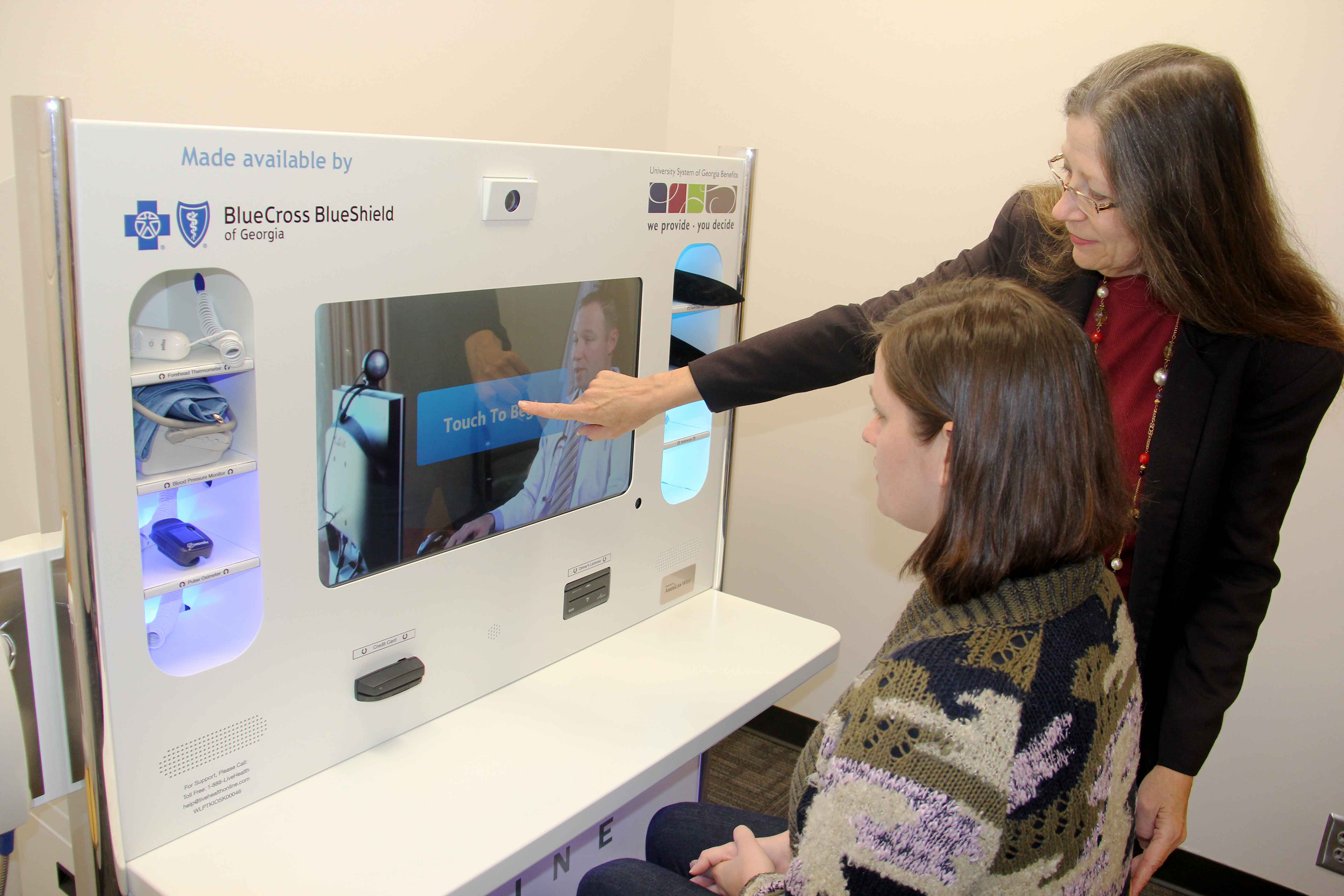
Georgia Highlands College has joined eight other University System of Georgia colleges in launching a system-wide pilot for LiveHealth Online Kiosks, a live two-way video machine with a board-certified doctor.
In 10 minutes or less, employees/students can see a physician for things like cough, cold, flu, sinus infections, urinary tract infections and so on. The doctor can answer questions, check vitals, make a diagnosis, provide treatment and even write a prescription, if needed.
The Kiosk has a touchscreen and phone. It also has several attachments, including a forehead thermometer, blood pressure monitor, pulse oximeter, stethoscope, otoscope, derm camera and scale, as well as a hand sanitation center for use before and after interacting with the Kiosk.
LiveHealth Online reports that 80 percent of consumers surveyed who have used the system stated they saved two or more hours by using LiveHealth Online and were able to completely resolve their medical issue.
The LiveHealth Online Kiosk costs $49 per visit, or if you have BlueCross BlueShield, the equivalent of an office visit copay.
Currently, GHC has only one Kiosk for use on the Floyd campus to help launch the pilot program.
Vice President for Human Resources Virginia Siler explained the installation of the Kiosk comes on the heels of GHC’s proactive interaction with the system office on well-being initiatives for the college.
“We [GHC Human Resources and President Don Green] have been instrumental in the creation of well-being challenges between the USG institutions, which the system office has coordinated as pilots,” Siler said. “Our initiative and support of these challenges for the past 12-plus months has, in part, resulted in the opportunity to pilot a LiveHealth Online Kiosk. We are constantly looking for ways to enable our students and employees to live healthier, happier, more active and productive lives. It is part of the culture at GHC.”
PHOTO: Human Resources Coordinator Emily Farmer demonstrates the new LiveHealth Online Kiosk at Georgia Highlands College to Senior Administrative Assistant Lindsay Little.
GHC Players to offer dinner and a show
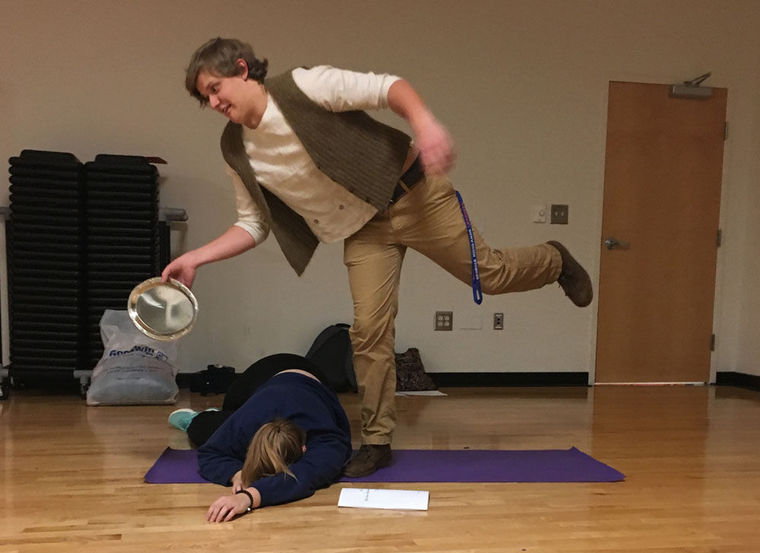
Students at Georgia Highlands College are offering a little mayhem and murder with a holiday theme during the college’s upcoming mystery dinner theater.
“Murder Under the Mistletoe,” a medieval murder mystery written by, directed by and starring GHC students, will start Dec. 16 at 6 p.m. at Heritage Hall, 415 E. Third Ave.
Tickets for the dinner and show cost $15 for students, both in high school and college, and $20 for adults. The price includes a meal of salad, turkey legs, mashed potatoes, vegetables and a dessert. There also will be a vegetarian option for the entree.
“We tried to stick with a medieval theme and decided turkey legs would fit,” explained Bryce Pitts, member of the GHC Players and co-writer of the script.
To make sure the caterer has enough food, the deadline for purchasing tickets is Dec. 12. Tickets may be purchased through a link on the GHC Players’ Facebook page or by emailing Pitts at bpitts1@student.highlands.edu.
The GHC Players just started this year, Pitts explained, because so many students at GHC wanted to participate in the arts.
“It is hard at a community college to have a big arts program,” she said. “We wanted to show that there is a lot of talent at Georgia Highlands.”
The dinner theater is being put on as a fundraiser for the Players, Pitts said.
“We had a group of people at the school who get together and sing,” she continued. “We were singing carols one day and thought it would be fun to perform. Then we started talking and all of these ideas came up, so we decided to write a Christmas mystery play and incorporate the carols into it.”
Pitts wrote the script along with fellow student Kendalyn Millsap. The production is being directed by GHC student Autumn Townsend and the group’s faculty advisor is Julie Carver.
“We are really proud of the fact that students are able to write and direct the production,” Pitts said. “It’s completely student-driven.”
The play tells the tale of King Androse and Queen Rosalind who want to marry their daughter Princess Juno to a prince. They enter into an agreement with another kingdom they’ve been feuding with and agree to a party at Christmas time.
“Suddenly, something goes very wrong and someone is murdered on Christmas Eve,” Pitts shared. “The Royal Fool takes the audience on an adventure trying to find out who the murderer is.”
The Fool breaks the fourth wall of the production and narrates the action, she added.
Right before dessert, cards will be passed out to the audience, who will be asked to write down who they think is the murderer. After dessert, the truth will be revealed.
The Players are hoping to do another, bigger production in the spring, Pitts said. “This dinner theater will help us fund that,” she said.
Students from two of GHC’s five campuses comprise the group, with the production being manned by Floyd County and Cartersville students.
“If we have a good response, we hope to keep doing this,” Pitts said. “We hope to make this a tradition and expand the arts programs at the school.”
AS SEEN IN THE ROME NEWS-TRIBUNE: http://www.northwestgeorgianews.com/rome/news/local/ghc-players-to-offer-dinner-and-a-show/article_343ac3ac-b9f7-11e6-9c50-7fdc0760498b.html
Pollinator garden featured in PBS special
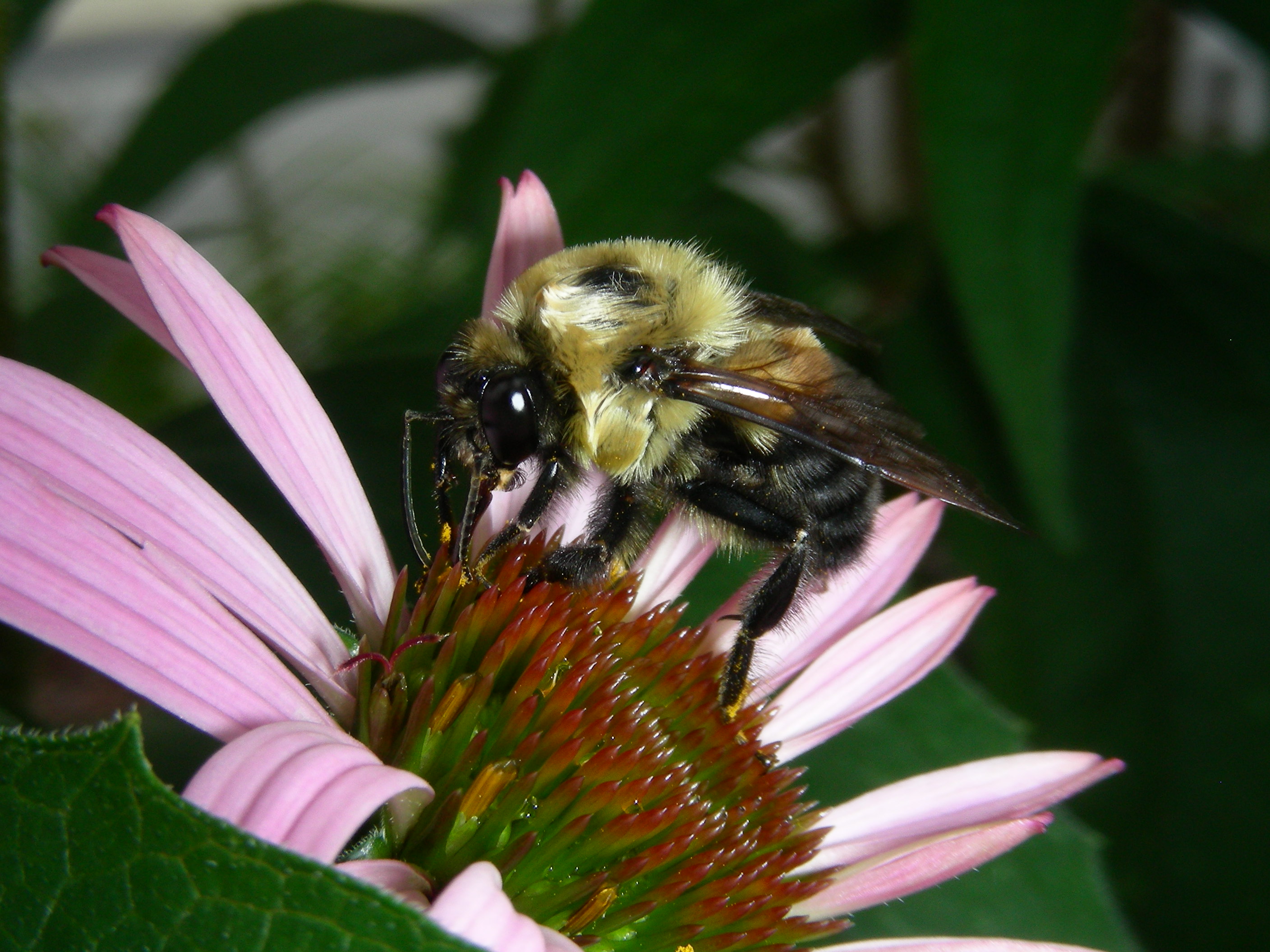
In the middle of an area surrounded by concrete and asphalt sits a flower garden designed as a refuge for butterflies, hummingbirds, bees and other pollinators that need a place to refuel.
Situated behind the academic building on Georgia Highlands College’s Cartersville campus is a 300-square-foot pollinator garden started in May 2013 after one of Dr. Jackie Belwood’s students brought her a hummingbird that had fallen from the sky.
“This was during a time when the hummingbird would have been migrating,” Belwood said. “Those little hummingbirds are going to travel 800 miles between northern areas and warmer climate. Some of them will go as far as Mexico or the Caribbean.”
The associate professor of biology knew what the problem was — the college was located in a spot where native vegetation used to be, and without flowers and other plants that were once more common, the hummingbird couldn’t find a place to stop and eat on its journey to its winter home.
The incident led to the birth of the pollinator garden, a joint project between GHC’s Green Highlands student environmental club, Greater Atlanta Pollinator Partnership and Keep Bartow Beautiful.
The original garden consisted of three 4-by-8 and three 4-by-4 raised beds, but more beds were added during the summers of 2014 and 2015. It contains such pollinator-attracting flowers as black-eyed Susan, blazing star, bronze fennel, erect goldenrod, giant purple hyssop, lantana, New York ironweed, passion flower and trumpet honeysuckle as well as various varieties of salvia, sage, aster, milkweed, sunflower and mint.
“From an ecological point of view, it constitutes its own small but thriving ecosystem in the middle of a biological desert of large tracts of manicured lawn surrounded by buildings, concrete sidewalks and asphalt roads,” Belwood said. “Anyone who looks at the garden, myself included, is continually amazed at the large number of insects buzzing around the garden on warm afternoons or mornings. This is all the more striking considering the ecologically barren environment in which the garden is located.”
The native and non-native flowers — mostly perennials — bloom from spring to frost, and some species like the butterfly bush and lantana bloom for four or more months, Belwood said.
“Most produce flowers for adult pollinators, while others — [for example] copper fennel, passion vine, milkweed — are host plants for immature forms such as the caterpillars that develop into butterflies and moths,” she said.
She added the garden contains locally grown flowers rather than “fancy new varieties of flowering plants available at big-box stores” that are interesting to look at but do not attract pollinators.
The garden has been successful in drawing pollinators into it, attracting such species as bumblebees, native bees and butterflies, which are all declining in number, as well as moths, flies, beetles and ruby-throated hummingbirds, Belwood said.
“It’s amazing the huge number of pollinators it attracts,” she said. “Every time I see them, I think about that initial hummingbird and how it all started. I’m happy to say we have become a fuel station on their migration highway.
“We had tremendous reproduction of Gulf fritillary butterflies — from caterpillars — this past summer. Also many clear-winged hawkmoths. Monarch butterflies used the garden during fall migration as a refueling station on their way to overwintering grounds in Mexico. The garden is also home to a large number of predatory insects and spiders that rid the garden of potential pests. We don’t use pesticides.”
She added the gardeners are “far more interested” in attracting native insects than honey bees, which are European honey bees that have been “domesticated.”
“It should be noted that anything we do to protect native species will also help protect honey bees, which most people know are in decline,” she said.
The garden is doing so well that it’s being featured in a 30-minute PBS special on pollinators called “Growing a Greener World,” which was filmed in September and will air next spring.
“I was thrilled that PBS ... wanted to film the garden,” Belwood said. “I was happy with how the filming went. The crew spent half a day at GHC and another half day in my garden at home [in Acworth] and at Smith-Gilbert Garden in Kennesaw.”
Besides providing a haven for valuable insects, the garden is being used to “educate our students, faculty and staff about the importance of pollinators and pollinator gardens,” Belwood said.
“The garden also has the potential to serve as a small, outdoor, hands-on laboratory and research space for anyone interested in science or an inspirational space for anyone interested in nature,” she said.
On a bigger scale, “we want it to serve as a model for how individuals and other organizations in northwest Georgia can engage in pollinator conservation,” Belwood said.
“In terms of pollinator conservation, it is encouraging to think that even a small plot of flowers and insect host plants, such as provided by our garden, can have a positive impact on a local scale,” she said. “Our vision is to encourage others to create similar environments in a multitude of locales. Working together, we can do a great deal to help conserve pollinators one garden at a time.”
Belwood’s interest in pollinator conservation sprang from her lifelong interest in insects, which led to her earning a doctorate in entomology.
Before coming to GHC, she said she was “heavily involved in the conservation of natural resources, which include pollinators — bees, butterflies, moths, other insects, hummingbirds, nectar-feeding bats in the tropics, etc. — and their habitats.”
“In recent years, pollinator populations have experienced serious declines as a result of habitat loss, overuse of pesticides and climate change, including drought, and I want to do everything I can to reverse those trends,” she said. “Education is key in all of this.”
The effect of pollinators on agriculture, Georgia’s largest industry, is another reason Belwood said she wants to help conserve them, “given that one-third of all the food we eat is the direct result of the action of pollinators,” she said.
“Pollinators help two-thirds of the world’s crop species reproduce,” she said. “I look at pollinator conservation in the light of protecting our food supply.”
AS SEEN IN THE DAILY TRIBUNE NEWS: http://www.daily-tribune.com/newsx/item/6826-ghc-s-pollinator-garden-featured-in-pbs-special
GHC offering kickoff for personal development classes Dec. 3
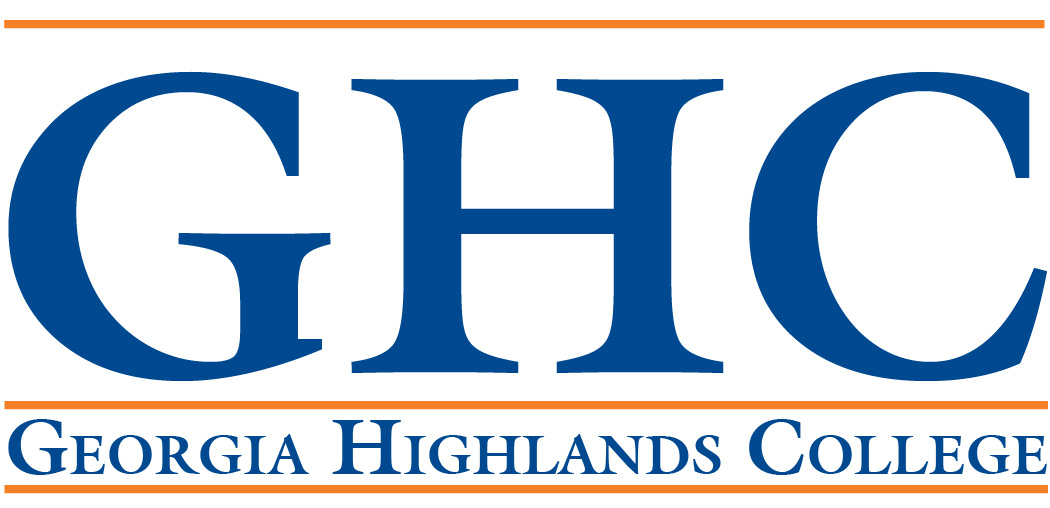
The Office of Continuing Education at Georgia Highlands College will begin offering a slate of personal-development courses in January that people can take just for fun.
As a sample of what classes are to come, the college will host a Personal-Development Kickoff Saturday, Dec. 3, on the first floor of the three-story academic building on the Cartersville campus.
At the event, community members ages 16 and older can take short, two- to three-hour versions of some of the classes that will be offered spring semester: digital photography, self-defense, finances and computers.
“Personal-development courses were a part of the GHC Center for Continuing and Professional Education for a long time,” CCPE spokesman Chris Harvey said. “They were cut when the CCPE was downsized several years ago. Recently, our advisory board and others have suggested adding them back in. GHC sees it as a way of utilizing our resources for the benefit of the community, reaching people who don’t want or need to take an academic course. Just to make sure people understand, these courses are not academic courses and do not grant any college credit. They are meant as a fun opportunity to learn something new.”
A kickoff offering a condensed version of the classes is a “fun way to introduce the idea of offering personal-development courses to the public,” Harvey said.
“People can sign up for more than one course,” he said. “We recognize that this time of year is really busy for people so we thought it would great to do it all in one day.”
The kickoff schedule is:
• Introduction to Digital Photography, taught by Jim Garrett, from 9 a.m. to noon.
• Savvy Social Security Planning for Baby Boomers, taught by Susan Simonton, from 10 a.m. to noon.
• Computer Maintenance You Can Do at Home (Windows), taught by Roger Koo, from 10 a.m. to noon.
• Less Than Lethal Force, taught by instructors from Armed Citizens of Georgia, from 11 a.m. to 2 p.m.
• 25 Documents You Need Before You Die, taught by Simonton, from 1 to 3 p.m.
• Winter Landscape Photography, taught by Garrett, from 1 to 4 p.m.
• Computer Maintenance You Can Do at Home (Apple), taught by Koo, from 1 to 3 p.m.
All classes are $25 each except Less Than Lethal Force, which is $60.
Registration is already open, and the deadline to register is Nov. 30.
Besides the classes offered during the kickoff, the department also will offer English for Speakers of Other Languages and Heartsaver CPR courses during spring semester, Harvey said.
“Over time, additional courses that will be added include fitness, public speaking, drones, digital scrapbooking, getting the most out of your cell phone, creative writing and filmmaking,” he said. “Some of these courses were recommended to us by our advisory board and others, while other courses are popular courses at other locations. Some of the courses are being done in conjunction with partnerships with local groups as well. There will also be a wide variety of summer camps just for kids.”
Anyone interested in teaching a course or who has an interesting idea for a course can email Harvey at charvey@highlands.edu.
“We are always looking for new instructors,” he said.
For information about the kickoff or classes, contact Harvey or Director of Continuing Education George White at 678-872-8240 or gwhite@highlands.edu.
AS SEEN IN THE DAILY TRIBUNE NEWS: http://daily-tribune.com/newsx/item/6730-ghc-offering-kickoff-for-personal-development-classes-dec-3
GHC sees fifth consecutive enrollment increase, fall enrollment up 4.6 percent
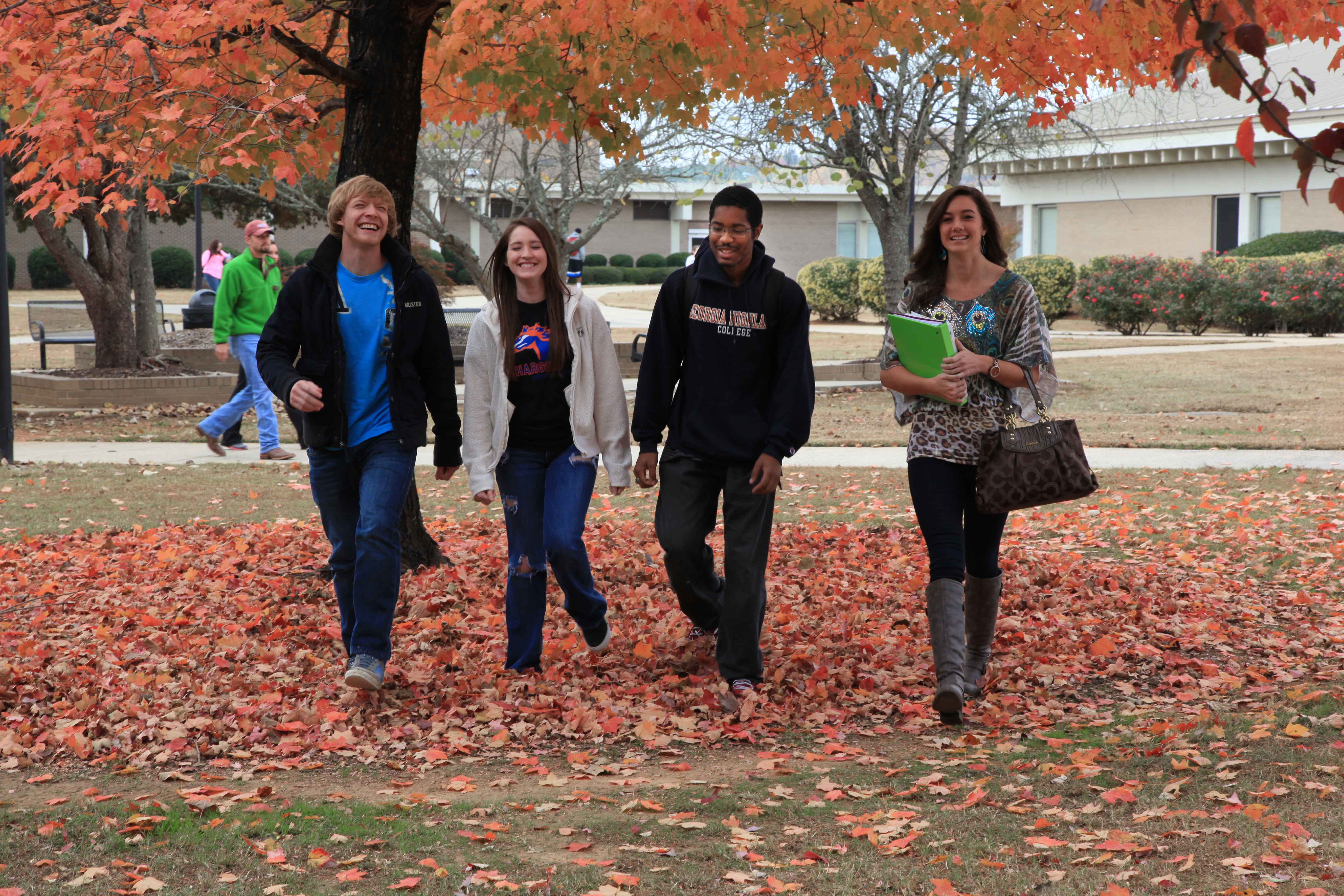
Georgia Highlands College fall enrollment saw yet another bump this year with an increase of 4.6 percent. This is the fifth consecutive enrollment increase for GHC. This increase follows a 9.9 percent increase in the summer, a 6.3 percent increase last spring and a 7.1 percent increase last fall.
President Don Green stated the value of a GHC education is one of the driving factors for GHC’s continual enrollment increases.
“GHC remains one of the most affordable, accessible and valuable USG options in Northwest Georgia,” he said, “and our enrollment increases prove that. I’m glad we offer our students the same classes as larger institutions at half the price with a full associate degree for less than $8,000—one of the many reasons GHC was acknowledged as the best return on investment for state colleges in Georgia.”
According to the University System of Georgia, this fall’s enrollment continues a trend across the state, for three years in a row, of modest increases in student enrollment throughout the University System of Georgia. This fall’s enrollment also marks the first time headcount and full-time equivalent (FTE) enrollment both surpass the University System’s former enrollment peak of fall 2011.
“This is the third consecutive year we’ve seen our fall enrollment grow,” said USG Chancellor Hank Huckaby. “As we expand access to public higher education, we are seeing an increase in high school students getting an early start, as well as a larger number of students pursuing graduate degrees.”
The deadline to apply for spring semester at Georgia Highlands College is December 15. Students can apply at highlands.edu and spring classes will begin January 7.
For the full USG enrollment report for fall 2016, please visit: http://www.usg.edu/assets/usg/docs/news_files/BOR-USG_Fall_2016_Enrollment.pdf
Basketball tournament to honor former employee and fan Dana Davis
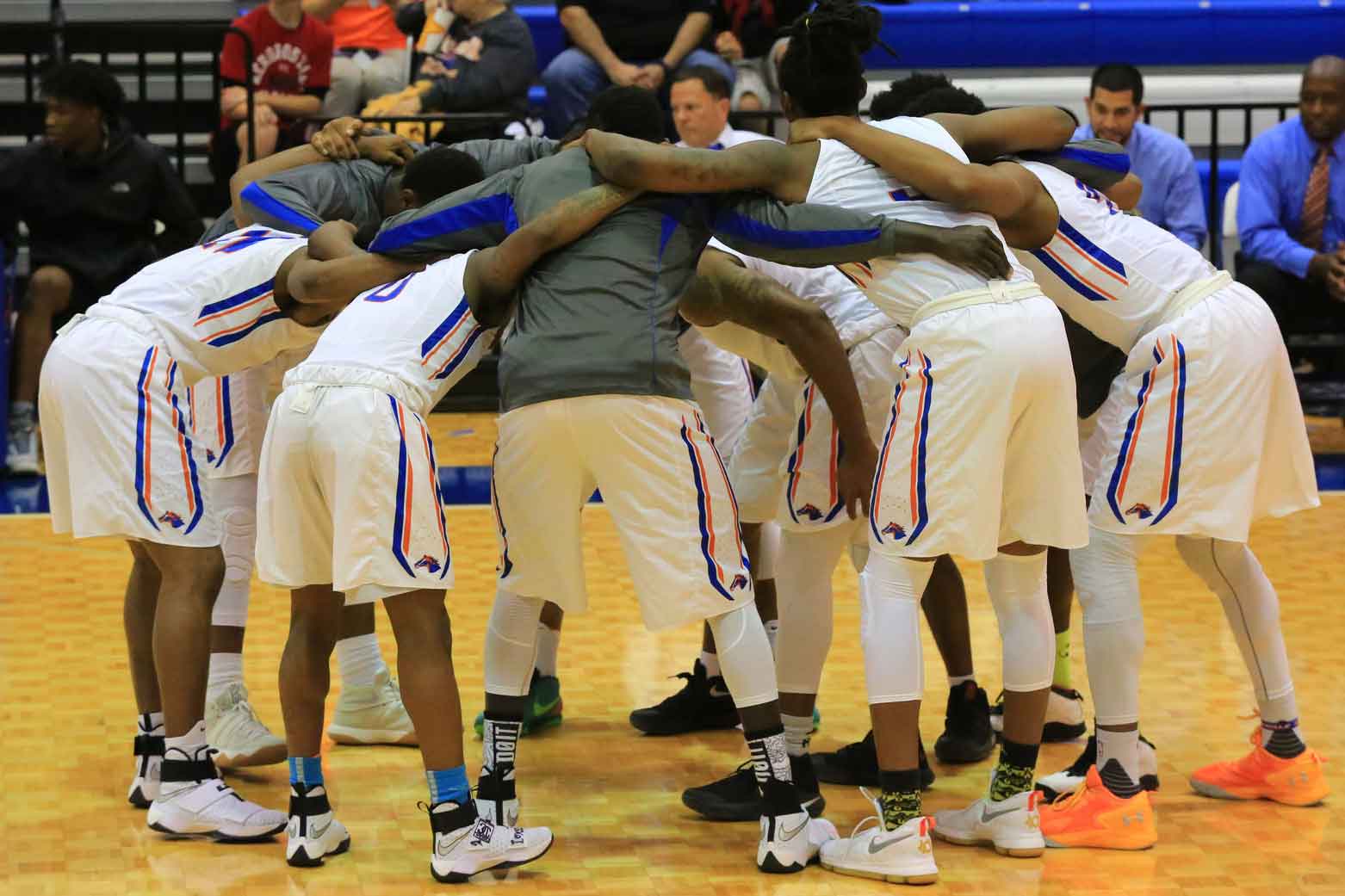
The Georgia Highlands College basketball teams will be holding a tournament in honor of Dana Davis, who passed away this year, called the Dana Davis Classic. The tournament will have four games over two days, starting on November 18 at 7:30PM at the Floyd campus gymnasium.
Assistant Director of Athletics David Mathis said the Charger and Lady Charger Basketball teams lost a dear friend when Dana Davis passed in 2016. She served 10 years as college relations director at GHC before retiring in 2014.
“The Dana Davis Classic is in honor of former GHC employee and one of GHC basketball’s biggest fans Dana Davis,” Mathis said. “Since the men’s and women’s basketball teams were formed, she could be found cheering at every game right behind the players’ bench. She also provided game night deserts, meals at her home, and financial and counseling support for the players. Her spirit, smile and generosity will never be forgotten by the Charger family.”
The Dana Davis Classic schedule: Middle Georgia versus Chattahoochee Tech (November 18 at 7:30PM); FBCA versus GHC (November 18 at 7:30PM); Chattahoochee Tech versus FBCA (November 19 at 1PM); and Middle Georgia versus GHC (November 19 at 3PM).
GHC named a Top Military Friendly College for the fourth time in the last five years

Military Advanced Education & Transition (MAE&T) has awarded Georgia Highlands College the designation of a Top School in its 2017 MAE&T Guide to Colleges & Universities, measuring best practices in military and veteran education. GHC was also recognized by MAE in the 2012, 2014, 2015 and 2016 editions.
The Guide will be released late December, and is available online at www.mae-kmi.com.
The Guide presents results of a questionnaire of the military-supportive policies enacted at more than 600 institutions, including private, public, for-profit, not-for-profit, four-year, and two-year colleges. From community colleges to state universities, online universities and nationally known centers of higher learning, MAE&T’s 2016 Guide to Colleges & Universities arms students with information about institutions that go out of their way to give back to our men and women in uniform.
Now in its tenth year of publishing the Guide, MAE&T was the first publication to launch a reference tool of this type. This year, institutions were evaluated on their military culture, financial aid, flexibility, general support, on-campus support and online support services. Each school’s performance rating by category is represented by an easy-to-recognize dashboard. This enables prospective students to quickly target schools that follow best practices in military education, and then put these in context with other academic or career considerations.
With input from an advisory board of educational and government experts, and criteria based on recommendations from the VA and military services, MAE&T’s Guide to Colleges and Universities provides the foundational information a prospective student would use in framing his or her educational needs.
Not only is the 2017 Guide printed in the December issue of Military Advanced Education &Transition, but also published in a searchable database online. Students will have access to all the survey questions and answers provided by the schools, as well as explanations about critical issues like activation and deployment policies, withdrawal policies, scholarship and financial aid information and important support information.
Visit www.mae-kmi.com for online access to MAE&T’s 2017 Guide to Colleges and Universities, or pick up a copy of the December issue of Military Advanced Education & Transition.
For more information about Georgia Highlands College Veterans Affairs, please contact Veterans Affairs Coordinator Amy Wise at acasey@highlands.edu.
GHC student receives $1,000 public safety scholarship

Georgia Highlands College graduate Faruq Lawal has been awarded a $1,000 Law Enforcement Education Program Dream Scholarship.
He is among 22 top students who will receive the award to encourage their pursuit of law enforcement/public safety careers by the professional public safety officers of LEEP.
Lawal earned a 3.4 GPA at Georgia Highlands College, where he recently completed his criminal justice degree. He plans to use his LEEP scholarship to pursue a degree in public policy and management at Kennesaw State University, where he also received a Pell Grant.
He is looking for work as a security guard, and his career goal is to become an immigration lawyer.
“My experiences working with children in the community have proven to me the need for solid and compassionate community policing,” Lawal wrote in his scholarship application. “I want to make a change in the world. This scholarship will help me accomplish that dream through my career in law enforcement.”
Lawal has worked as a certified nursing assistant at Amicus Homecare since 2013, earning Best Employee of the Month three times.
He is a GHC Foundation Camp counselor, Fellowship Christian Athletes leader, Habitat for Humanity volunteer and a tour guide for Grove Park Elementary. He won the Spirit Award as Brother 2 Brother vice president at Georgia Highlands.
In high school, he was football team captain, a Spanish Club member, track leader and a member of the basketball team. In college, he was a debate group leader and a football team mascot and earned a Who’s Who in American Junior Colleges Award.
“Faruq is the vice president of our most active organization on campus, Brother 2 Brother, which is dedicated to the success of minority men on the college level,” GHC Dean of Humanities Jonathan Hershey wrote. “He is also dedicated to helping others in the community. He has worked as a counselor at our summer camp for at-risk boys, Foundation Camp. More recently, he has organized an effort to create mentors for middle and high school students in the area. Faruq Lawal is a student that goes the distance in every area of his life as a student, on and off campus. He takes his learning seriously, but he also touches many others in his efforts as a campus leader and community servant.”
Other scholarship winners include: Steven Carlton of Alabama; Lena Illig of Alaska; Kyle Hartsuck of Arizona; Erin Daly of Connecticut; Delaney Henderson of Florida; Austin Leggett of Illinois; Samantha Newby of Indiana; Revel Lewis IV and Erik Vokoun of Kentucky; Mason Averill, Blake Erickson, Ryan Ferguson, Jacob King, Jenna Klokkert, Austin Lynema and Victoria Gunst of Michigan; Alexis Hower of Nebraska; Philip Grella of New York; Evan Guin of Tennessee; Rankin DeRonde of Texas; and Michaela MacDonald of Wisconsin.
In its 12th year, LEEP has awarded $162,000 in Dream scholarships to students showing a demonstrated interest in public service/law enforcement careers. The non-profit public safety group’s scholarship program is made possible by a growing list of national supporters.
Visit www.leepusa.com for more information about LEEP programs.
AS SEEN IN THE DAILY TRIBUNE NEWS: http://daily-tribune.com/newsx/item/6611-ghc-student-receives-1-000-public-safety-scholarship
Michelle Edwards finds her chance to achieve her dream of a college education at GHC
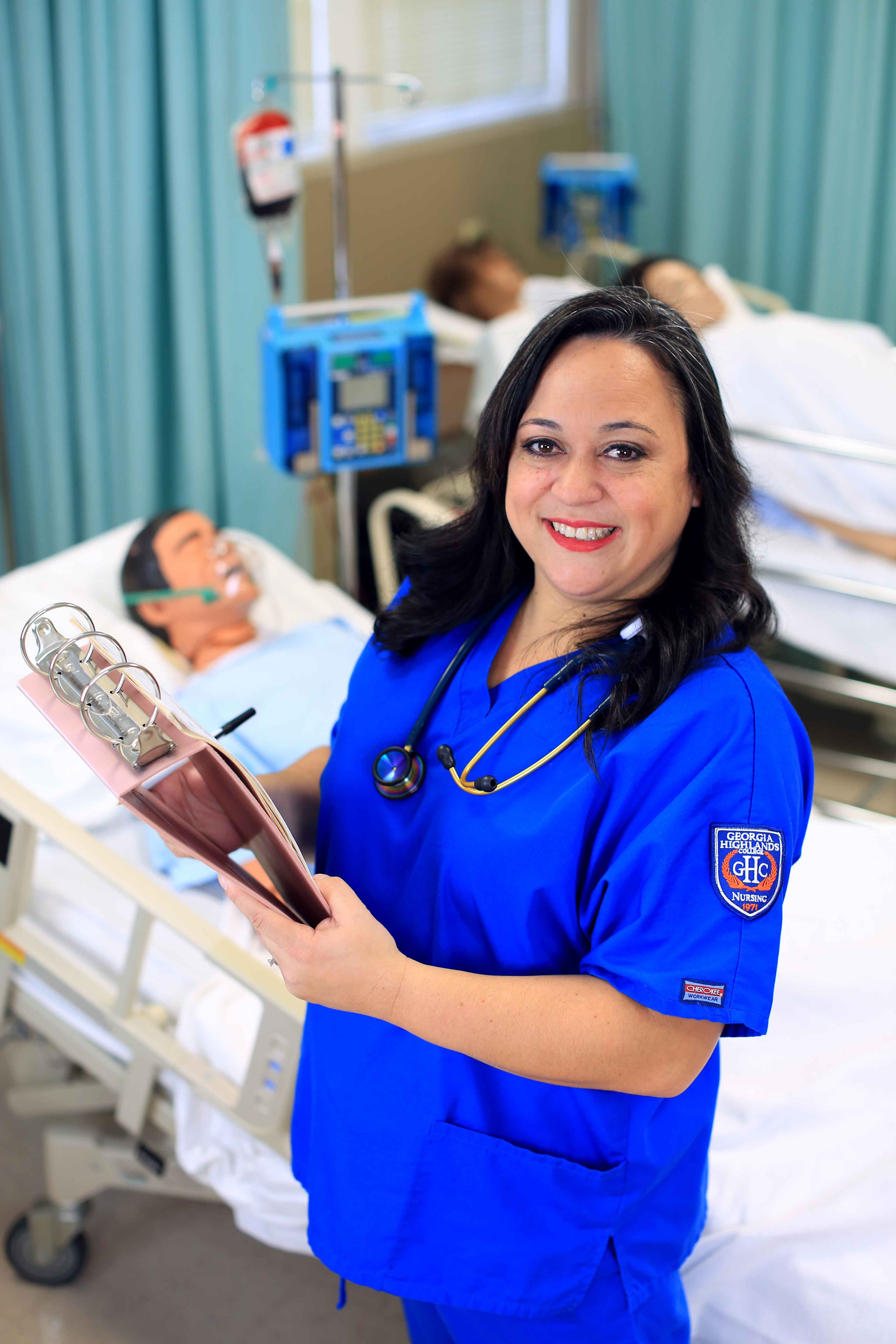
At 25, Michelle Edwards was a single mother living in an apartment with her son and teaching English for a living in Guatemala. She was born and raised in this third largest Central American country in 1974 as the first of three daughters.
“After I graduated high school, I had the opportunity to go to college in Guatemala, but I fell in love,” she said. “You know that story…”
Michelle found herself alone with her son with no outside help.
“It was rough—very, very rough,” she said. “Being a single mother in Guatemala is not an easy thing. There is no WIC, no food stamps, no governmental help—there isn’t even child support.”
Luckily, Michelle was able to find a job teaching English—her second language.
She said in 1988 she had the chance to participate in an exchange student program through her school. Michelle traveled to West Virginia.
“The only thing I could say was, ‘Hello, my name is Michelle,’” she said. “I learned English very quickly. You are forced to learn, especially when you are immersed and nobody speaks your language.”
Michelle took that skill to provide for herself and her son.
Some time later, Michelle was able to save up some money to take a short vacation to Miami to recharge. While she was there, she befriended someone she met while walking on the beach.
“There was no attraction right away,” she admitted. “It was just a quick chat. We exchanged emails and I said I was from Guatemala. He said he was from—where? Rome, Georgia? Where is that?”
Michelle said that she returned home from her vacation not expecting to ever speak to him again.
“He emailed me the first time and I ignored it. He emailed me the second time and I ignored it. And the third time, I answered,” she said. “It was 10 in the morning and we talked until 5 in the morning the next day.”
In 2009, Michelle married that person she met on the beach. She moved to the U.S. and never left. The two now have two kids together and each brought a child with them into the marriage.
“We are all Edwards,” she said. “We are all one family.”
Michelle was happily married with a full family, but felt she still needed to finish what she had never given herself the opportunity to start so many years ago.
“I had my opportunity to go to college in Guatemala and I blew it,” she said. “I want to be an example. How can I tell my child you need to go to college, if I don’t do it myself?”
So Michelle did just that. She applied to GHC and was accepted. She then applied to the nursing program and is nearly completed with her associate. Next, she will apply to the bachelor’s in nursing program at GHC.
“The best way to lead is by example. Opportunities don’t come to you. You have to go and look for them,” she said. “I think this is a redo for me…”
Michelle added she is more than happy that she chose GHC to pursue her dream.
“I feel like I am where I am supposed to be,” she said. “I love the openness of the people that work here. In most facilities trying to reach the president is impossible. Here you call Dr. Green and he’ll sit with you and have coffee. If you say, ‘I need help with this,’ they find a way to help you. People at GHC are open. The doors are open. You don’t feel restricted. You can walk into any office almost any time, and not have to make an appointment. There’s always somebody available and willing to help you. GHC has taught me that that the opportunity is there. All you have to do is go out there and find it, and they are here to help you do it.”
Pollinator Partnership earns national award, Pollinator garden at GHC featured in PBS special
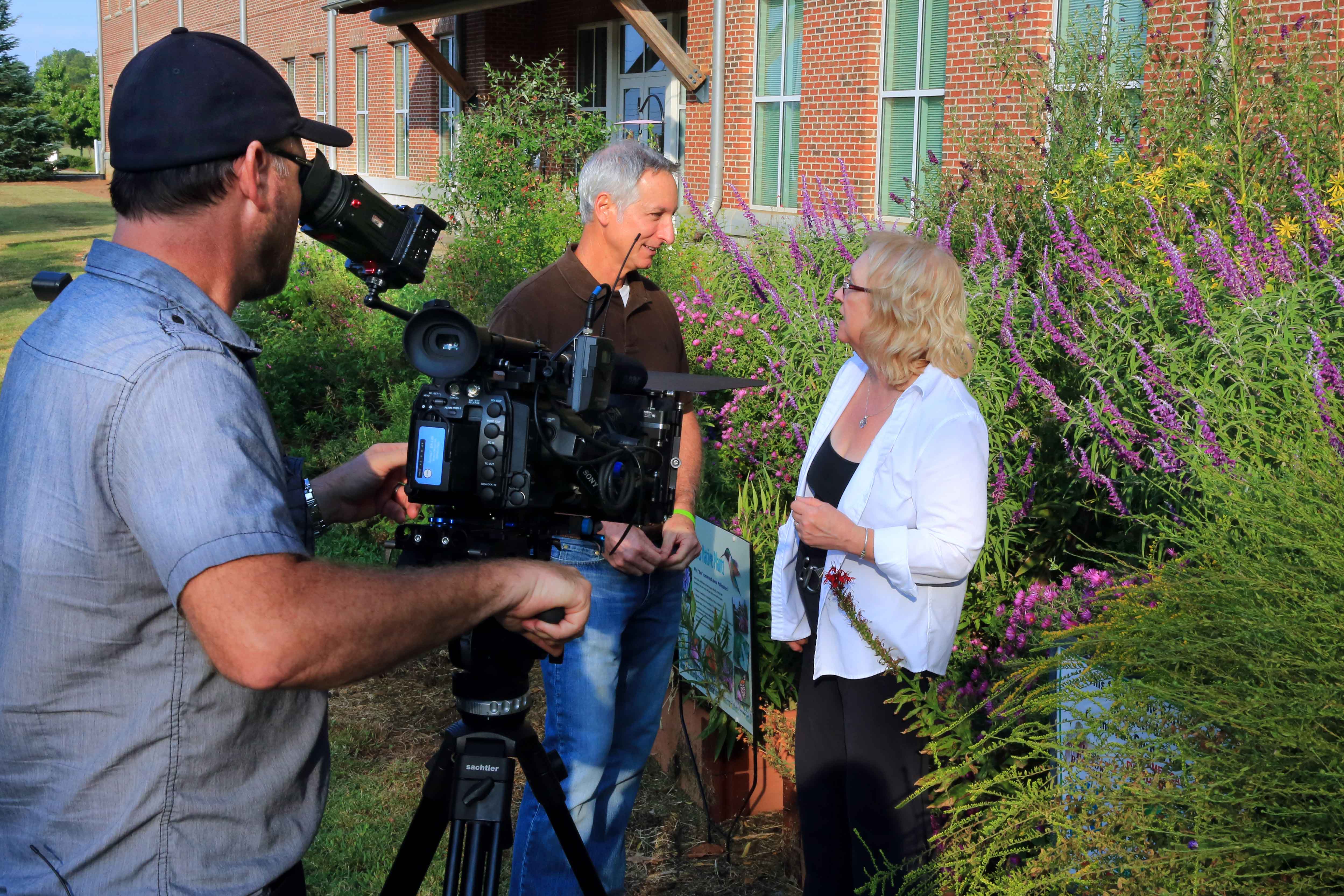
The 250-square-foot garden sits right in the middle of a lawn between asphalt, a parking lot and a major highway at the Georgia Highlands College Cartersville site. But the pollinators don’t mind the busy world around them. They are too busy in their own little world. Butterflies, caterpillars, bees, and more all give movement to the purple and yellow flowers.
Belwood says the morning is just as busy as the afternoon, as she points out a bee with a yellow coat of pollen on its back digging around the inside of a flower.
Four years ago, a student walked into Jackie Belwood’s office at the Georgia Highlands College Cartersville site with a hummingbird in her hands. The student explained how she had watched the bird fall from the sky on her way to class.
“This was during a time when the hummingbird would have been migrating,” Belwood said. “Those little hummingbirds are going to travel 800 miles between northern areas and warmer climate. Some of them will go as far as Mexico or the Caribbean.”
It was clear to Belwood what the problem was: the college now sits where native vegetation used to be, and in the absence of flowers and other plants that may have once been more common, the hummingbird couldn’t find any place to stop and eat on its journey south.
What’s worse is this wasn’t the first time this had happened.
“It was just bothering me,” she said. “There was nothing for them to feed on outside. They are such small animals and they are on such a limited energy budget, I finally said, ‘That’s it. Not on my watch.’”
Belwood met with student group Green Highlands that same year and together they created a pollinator garden with raised beds and perennial plants.
Meanwhile, Belwood was also working with her husband on a large-scale project they would eventually call the Greater Atlanta Pollinator Partnership.
“We were very concerned about the fact that wild habitat is being lost around the country due to development and all kinds of other things,” she said. “Pollinators are taking a pretty big hit, because when you take places that used to have plentiful plants and flowers and native vegetation and turn it into parking lots and lawns and things like that, wildlife and pollinators don’t have a place to go.”
Belwood stated this is a growing concern, given one-third of all food we eat is a result of the action of a pollinator.
Belwood said she and her husband were originally tasked to sponsor a single garden, but they came to a consensus that one garden just wasn’t enough.
“We drew a 25-mile radius circle around Atlanta, and we said we should be looking at a space like this for a pollinator conservation program,” she said. “We knew it had to be a pollinator partnership.”
From that, the Greater Atlanta Pollinator Partnership was born. It now holds a number of partners in the Greater Atlanta area who are all working to combat the growing problem of decreasing pollinators.
“We have a tendency to think of honey bees as the sole pollinators, but it’s not just honey bees. Pollinators by-and-large are in trouble,” Belwood said. “If you look at the billions of dollars’ worth of crops that are pollinated by these things, a lot of growers are extremely concerned. The almond crop farmers in California truck in bees from other states to service the almonds. Bees are moving around the country from place to place in trucks, and that’s common practice now.”
Belwood explained this is a very poor short-term solution.
“The long-term problem is we will begin to see a lack of food, and then food prices will go way up,” she said. “If you start to look at all the things you really like to eat, like fruits and vegetables, spices, coffee, herbs—those all need pollinators.”
The Greater Atlanta Pollinator Partnership has slowly become a model for how to promote pollinators on a very large scale. In 2015, Belwood, her husband and others earned a Conservation Award for their efforts in urban pollinator conservation in Georgia by Wings Across the Americas.
More recently, a PBS special called “Growing a Greener World” featured Belwood and the pollinator garden at GHC.
Belwood notes although the pollinator conservation effort is growing in Georgia, more focus should be given to these issues. And the seven-year GHC associate professor of biology added, it doesn’t take a lot to help make a big difference for pollinators near you—just look at the pollinator garden at GHC.
“We’ve added more beds over time,” she said. “It’s amazing the huge number of pollinators it attracts. Every time I see them I think about that initial hummingbird and how it all started. I’m happy to say we have become a fuel station on their migration highway.”
PHOTO: A PBS special called “Growing a Greener World” features Belwood and the pollinator garden at GHC.

